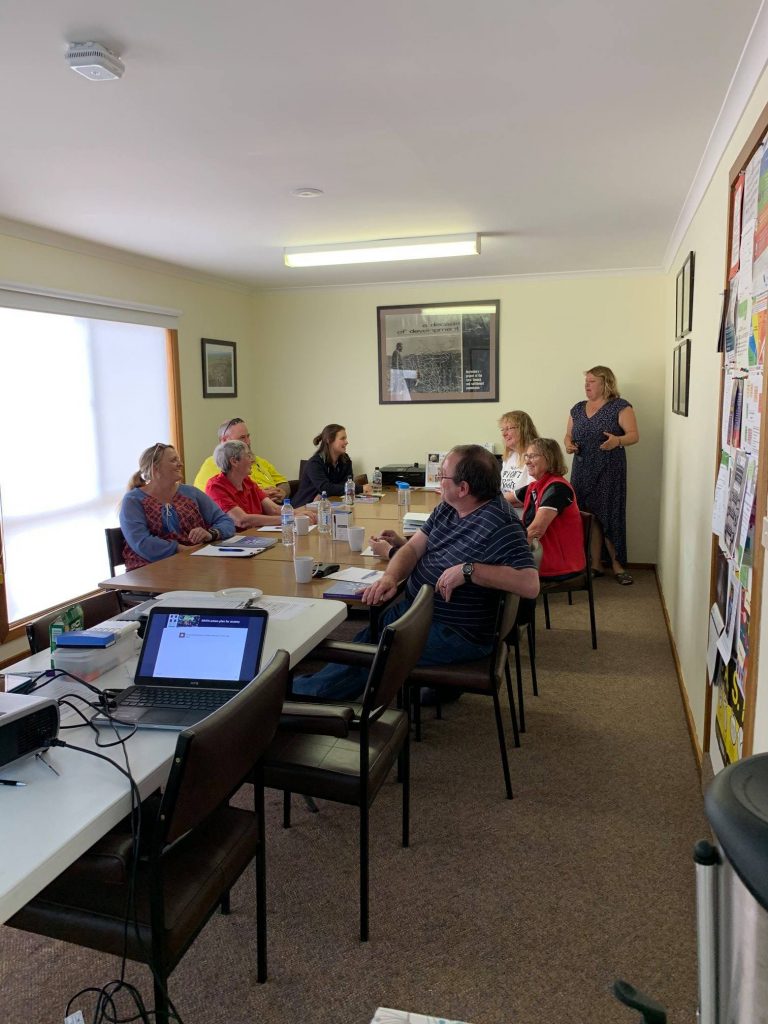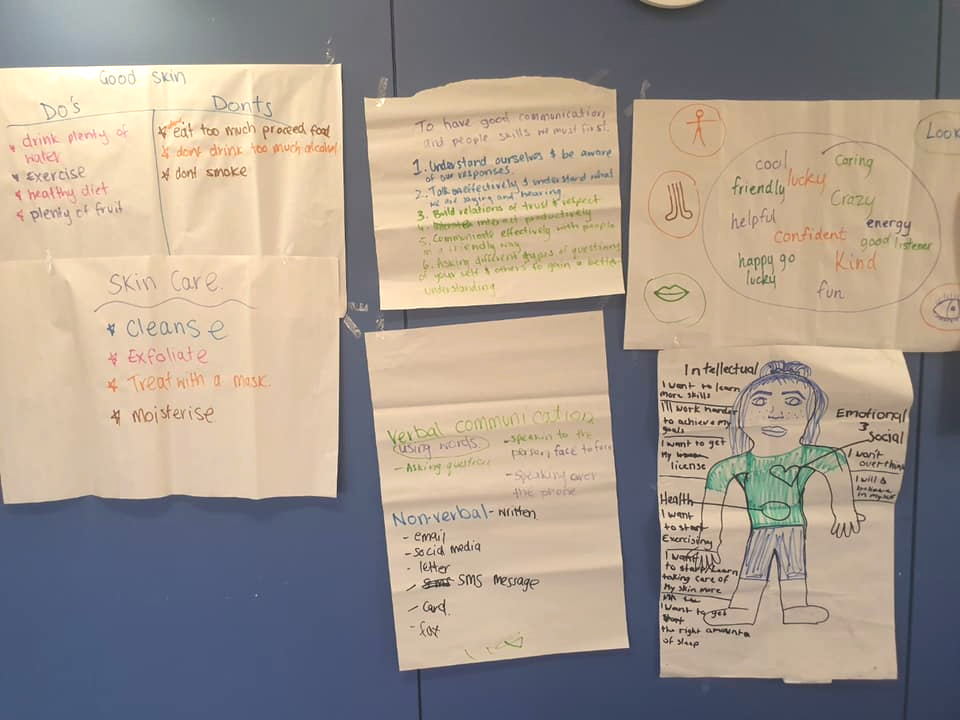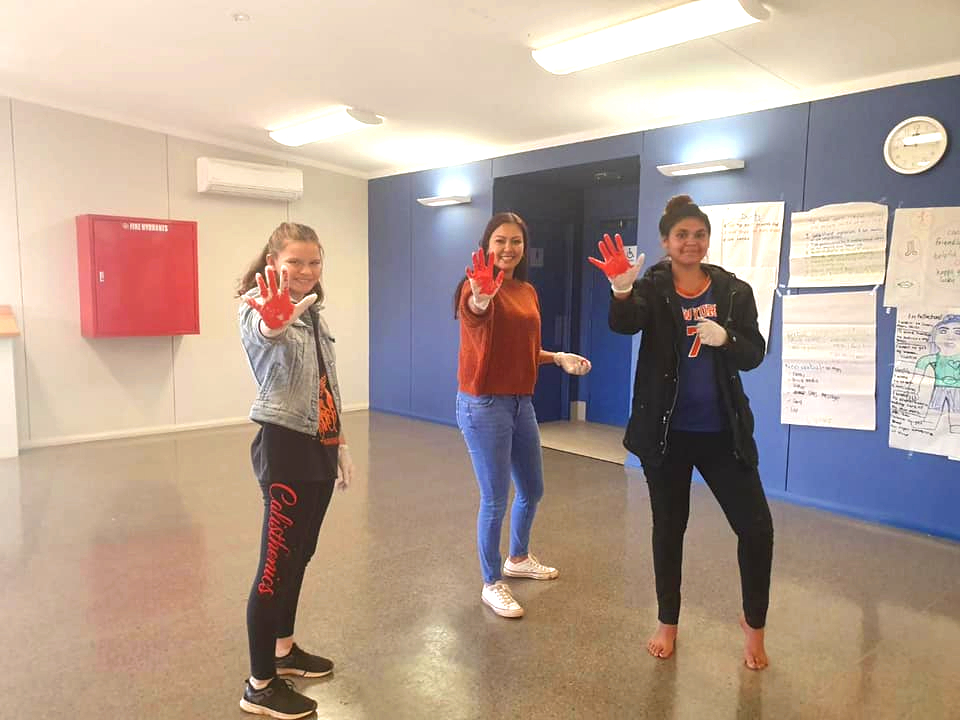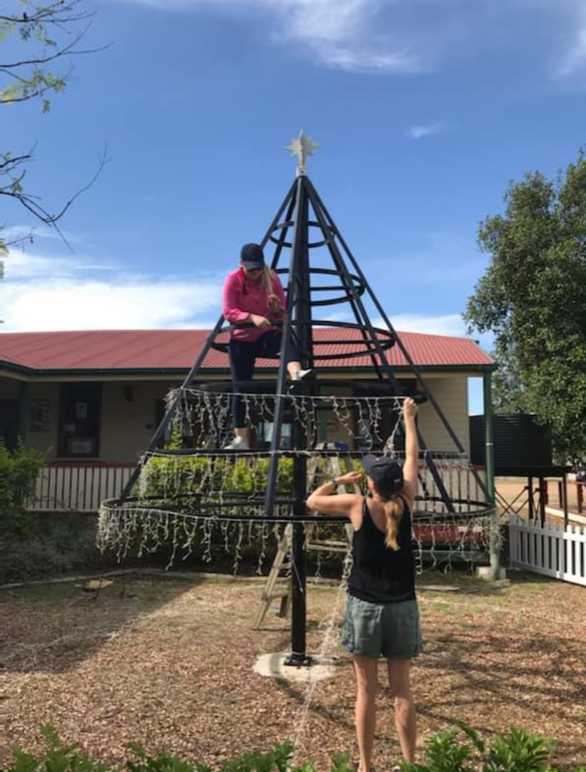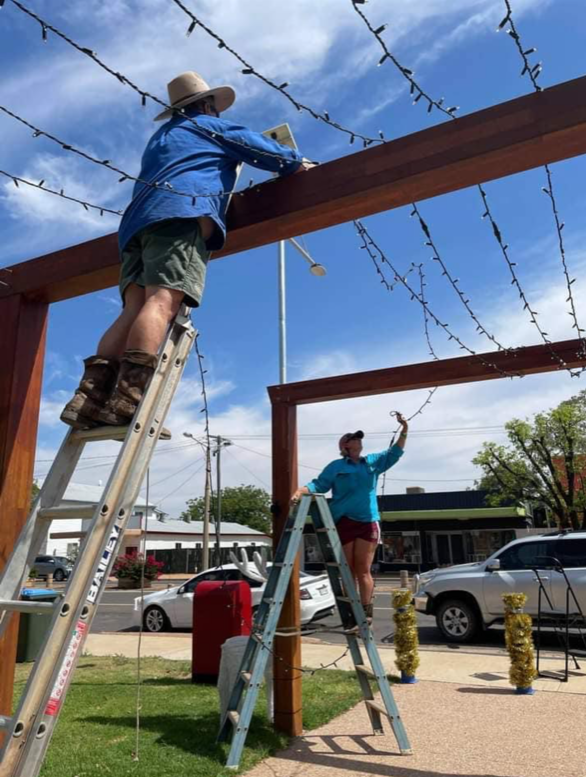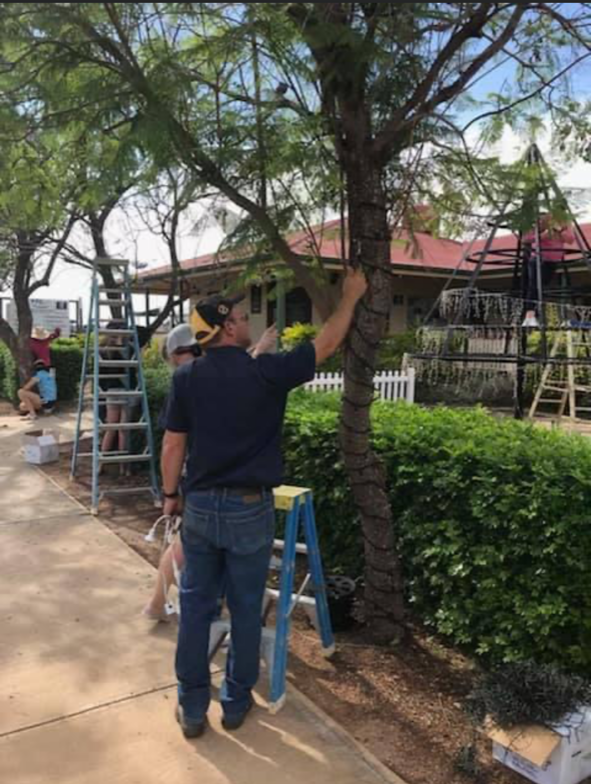Foundation for Rural & Regional Renewal (FRRR)
$120,000 in Gardiner Community Grants available
The annual Gardiner Dairy Foundation Community Grants Program (Gardiner Community Grants) has opened today. Delivered in partnership with the Foundation for Rural & Regional Renewal (FRRR), this round marks the 20th year of the program, which is focused on supporting communities across Victoria’s three dairying regions.
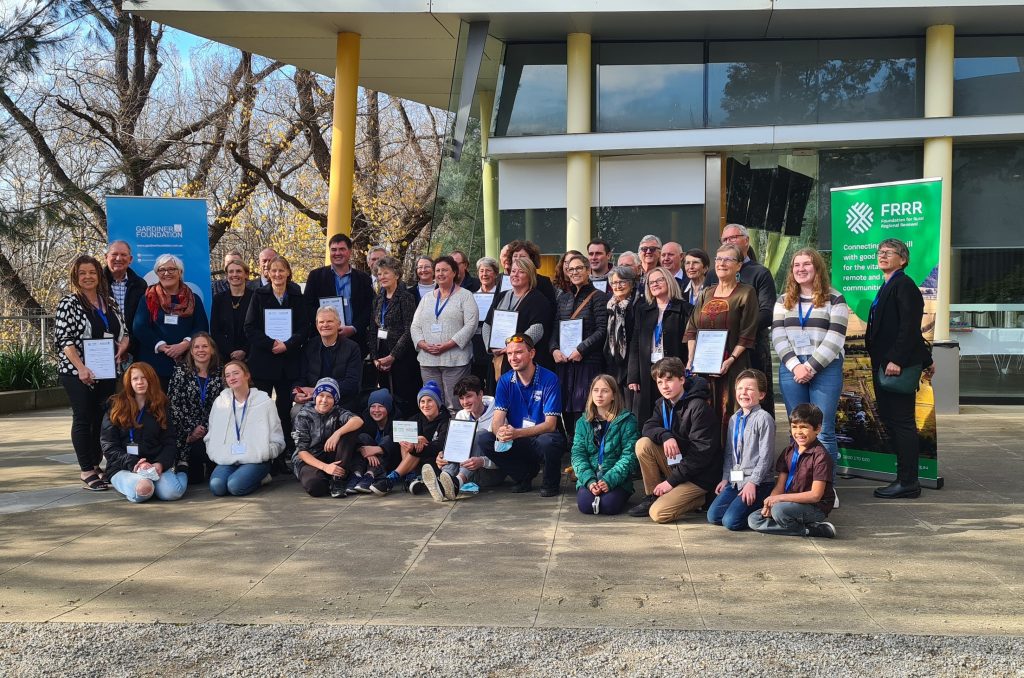
This year Gardiner Community Grants will encourage projects to focus on building the capacity of community organisations and improving digital connectivity. The new focus is in response to insights from FRRR’s Heartbeat of Rural Australia Report, which was published late last year.
The report highlighted that there was a significant digital divide in rural communities, compared to urban areas, and that local not-for-profit organisations needed capacity building support to be able to do their vital work, particularly following the impacts of back-to-back disasters, including COVID, on fundraising and volunteers.
A digital connectivity grant project might involve upgrading infrastructure and facilities, improving digital access or providing training that enables the community to benefit from digital services.
A building capacity grant aims to support organisations to sustain or grow the effectiveness of their operations. Funds may be requested for salaries to increase the organisations paid workforce, training for volunteers, upgrading office equipment or supporting strategic planning and improved governance.
The small grants program, which has $120,000 in available funds for grants up to $5,000, will continue to support a broad range of community projects that local groups identify can make their community socially, economically or environmentally stronger. Applications for events to enhance cultural vibrancy, volunteer planting projects to support environmental sustainability, extending education and training opportunities, support for infrastructure projects or programs to improve health and wellbeing are all encouraged.
Allan Cameron, Gardiner Dairy Foundation Chief Executive Officer, said Gardiner is committed to strengthening Victorian dairy communities and is pleased to be partnering with FRRR for the twentieth year to support innovative, community-driven projects.
“Investing in the communities that are at the heart of the Victorian dairy industry is critical to the sustainability of dairy farming in Victoria. Since launching the program with FRRR in 2002, Gardiner Dairy Foundation has supported over 500 local projects and distributed more than $2 million to Victorian dairy communities.
“Gardiner is committed to supporting the needs of the communities as they change and evolve, now, and in the future. That’s why, this year, we are encouraging initiatives around digital literacy and organisational capacity, to help local groups respond to the current needs of Victoria’s dairy communities,” Mr Cameron said.
Natalie Egleton, CEO of FRRR, said that the Heartbeat of Rural Australia Report called for more support to go to community groups to address critical issues, and it’s wonderful to see Gardiner Foundation respond.
“Our Heartbeat Report highlighted significant gaps and challenges for rural communities, but also highlighted the critical role that local not-for-profits play in meeting the needs and filling the gaps in rural communities. That’s why we value our longstanding relationship with Gardiner, because they, like us, are committed to working together to support these vital community groups in the long-term.
“For 20 years, Gardiner’s Community Grants have consistently boosted Victorian dairy communities with contributions towards large important community projects, and significantly enabling many smaller community organisations and projects, often for items and activities that are less accessible through government or major philanthropic funding,” Ms Egleton said.
Applications for the Gardiner Dairy Foundation Community Grants Program open Tuesday, 1 March and close Wednesday 13th April 2022 at 5 pm AEDT. More information can be found at – https://frrr.org.au/gardiner-communities-grants/.
Three regional communities to take part in multi-year initiative
FRRR’s Disaster Resilient: Future Ready (DR:FR) Victorian program continues to build steam, with three regional communities selected to partner with the Foundation to strengthen the resilience and preparedness of their regions.
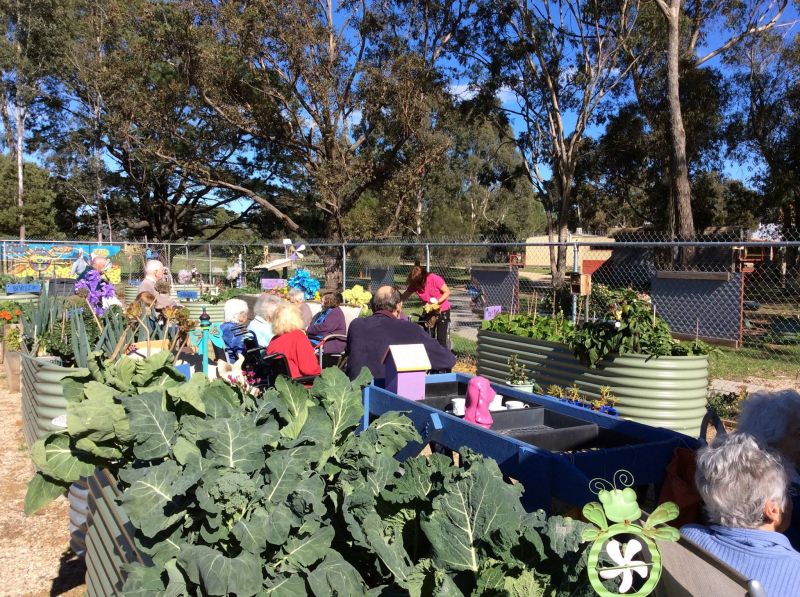
Korumburra, Myrtleford and Whittlesea township and surrounds will receive support as part of a multi-year, community-led program that is supported by a number of philanthropic organisations.
Nina O’Brien, FRRR’s Disaster Resilience and Recovery Lead, said that the DR:FR initiative works to better prepare communities to address the impacts of climate change, natural disasters and broader disruptions that affect the sustainability, vitality and resilience of remote, rural and regional communities across Australia.
“This is a place-based initiative, whereby FRRR works at a hyper-local level with grassroots organisations and community representatives who are interested in collaborating and leading initiatives to increase community preparedness and strengthen resilience capacity.
“The model is designed to help communities identify and then enact solutions that are held in local knowledge and the intersections of people and place. It creates space, facilitates processes, builds relationships and provides resources for community-generated resilience conversations and initiatives to be held at a pace and style that is appropriate for each local community,” Ms O’Brien explained.
Community driven
Late last year community representatives were invited to submit an Expression of Interest (EOI) to become partner communities. Over the past eight months, FRRR’s DR:FR Program coordinator has engaged with representatives from the shortlisted communities, listening and learning about what is unique and important to each place and exploring their readiness, willingness, and capacity to participate in this intensive process.
This process helped FRRR understand their shared aspirations, what they believe is important about their community and demonstrated the commitment and interest in participating in the program.
“The emphasis is on the communities being actively engaged and involved in the process. Our aim is to empower local people to build and adapt the strengths, tools and resources that already exist in each community to further strengthen the resilience and preparedness of each place. It will be community-led and tailored to each community, with support and resources provided to allow them to identify, create and sustain their own resilience-building approaches,” Ms O’Brien said.
The program will start in the next month, beginning with a series of activities to bring interested community members together and start engaging with the broader community around aspirations for the future. In addition to the facilitation support from FRRR, the communities will have access to funding for community activities that support community engagement activities and a seed funding pool to engage a local community connector and activate priority actions identified through the DR:FR journey.
More communities waiting in the wings
“While three communities have been selected, there is strong interest from other places to participate in this program,” Ms O’Brien said.
“We have several communities keen and ready to jump on board and we would love to work with them. Our hope is to expand this program to at least one other Victorian community, and we also have groups in other states wanting to be involved.
“But this requires further funding, so we and our partners can work alongside and support local leaders to create meaningful and lasting change that means they can endure, adapt and evolve from disruptions and disasters more quickly, positively and strongly.
“We are grateful to our current partners for making the Victorian DR:FR program possible. We’d love to hear from others with the capacity to partner with us to expand the program,” Ms O’Brien said.
The DR:FR initiative is kindly supported by the following partners: Sidney Myer Fund, Lord Mayor’s Charitable Foundation, Maple-Brown Family Foundation, Simon Kucher and Partners, Ronald Geoffrey Arnott Foundation, H & L Hecht Trust, Suncorp, Pinnacle Charitable Foundation and the Doc Ross Family Foundation.
For more information about the program, visit https://frrr.org.au/drfr-victoria/.
Significant funding to rebuild and recover from COVID
The Foundation for Rural & Regional Renewal (FRRR) has welcomed a significant boost to its flagship Strengthening Rural Communities (SRC) grant program, following an investment of more than $5 million from the Australian Government.
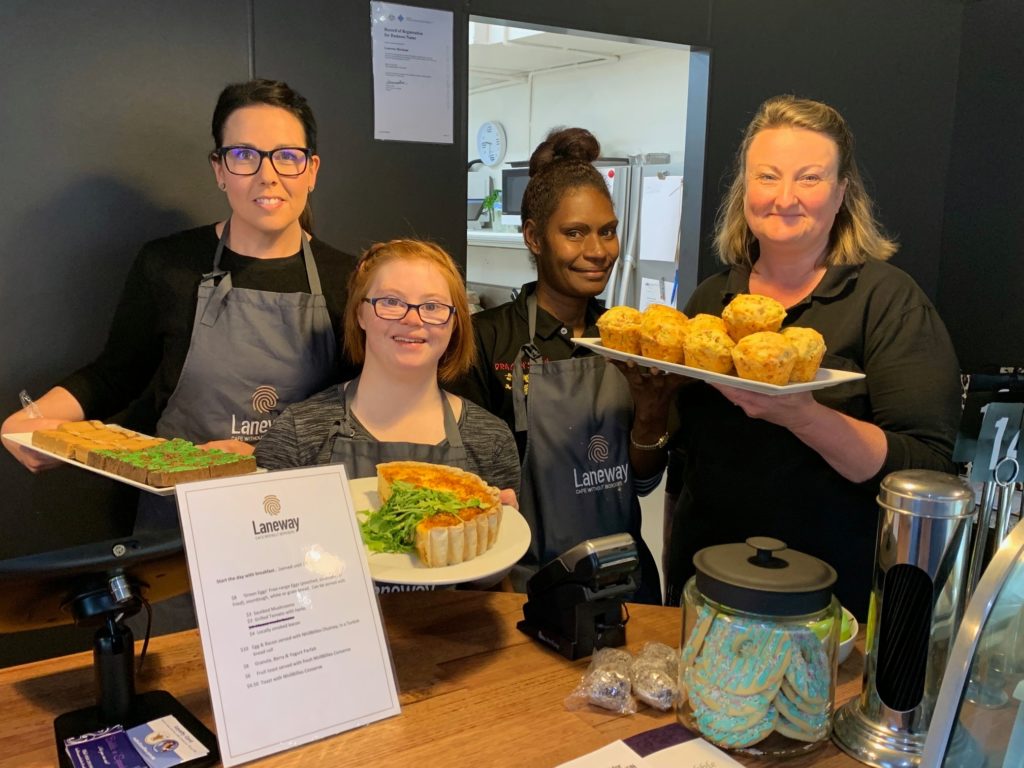
This funding, which will be available over the next two years, recognises the significant and long-lasting impacts of COVID and the localised effort needed to recover and rebuild vibrant remote, rural and regional communities.
From today, community groups and not-for-profit organisations in remote, rural and regional communities can apply for funding to support the recovery process, reduce social isolation, foster stronger, more resilient communities, or sustain these vital local organisations in their work.
The Australian Government’s support means that there will be $800,000 available in this round of SRC grants specifically for COVID-related projects. The COVID stream will have two tiers of funding – one will offer grants of up to $10,000 to groups working in communities of fewer than 50,000 people, while a second tier will offer grants of up to $50,000 for groups in remote, rural or regional communities (as defined by Australian Bureau of Statistics’ Australian Geography Standards).
Natalie Egleton, CEO of FRRR, said that the Australian Government’s investment is sorely needed and will be greatly appreciated by local organisations that have been struggling with raising funds, and coping with the effects of volunteer fatigue.
“At the end of last year, FRRR commissioned the Heartbeat of Rural Australia study, which confirmed that the pandemic has weakened the ability of community organisations to play their various roles in the community, at a time when, for many, demand for their services has increased.
“Many community groups that took part in the study – especially grassroots organisations with revenue of less than $50,000 – saw significant reductions in income as a result of not being able to run fundraising events and income-generating activities and, in some instances, funders redirecting their support. It’s also impacted the number of people able to volunteer, meaning that those remaining have been called on to do more, for longer. It’s no wonder people are exhausted.
“This program will help to rebuild rural communities by funding projects that respond to the ongoing impacts of COVID and will help communities get back on their feet.
“We’ve deliberately kept the SRC program flexible, as we know needs will be different from place to place, and from group to group. Projects eligible for funding could include supporting, training or attracting volunteers; running events; enhancing community facilities; developing services that assist people experiencing disadvantage; or purchasing equipment or resources that strengthen local organisations. We are very grateful for the Australian Government’s support and the commitment that they are showing to strengthen and rebuild rural communities,” Ms Egleton said.
In addition to the COVID funding stream, the SRC program still has grants available to support communities affected by the 2019/20 Black Summer bushfires. There is $650,000 available this round, through grants of up to $25,000. A third, more general stream of funding offers Small & Vital grants of up to $10,000 for initiatives that strengthen and support communities of 15,000 or fewer in remote, rural or regional areas.
To learn more about the program, and to apply, visit https://frrr.org.au/SRC. Applications close 31 May 2022 at 5pm AEDT.
Acknowledging the Wongutha people
Goldfields Girl is about leadership, confidence and building aspirational behaviours. Much more than a pageant, it’s a program that involves personal development, work readiness and community engagement activities for young Indigenous women between the ages of 16 and 25 from the Goldfields region, in south eastern corner of Western Australia. It’s based on the successful Kimberley Girl program, and has been operating since 2017.
Goolarri Media Enterprises (the operational arm of Broome Aboriginal Media Association Aboriginal Corporation) is behind the program, which is part of the overarching Young Women’s Pathways Program, helping young Indigenous women to realise their self-worth, gain confidence to dream big and to build goal setting behaviours.
In 2020, Goolarri’s aim for the program was to engage and participate up to 10 young women from Leonora in the program and workshops. Goldfields Girl is a contemporary cultural activity, and in the remote town of Leonora, there is nothing else like it for Indigenous women at this age and stage of life. The work readiness training and leadership development it provides can be transformational, providing a pathway for successfully navigating transition from school to employment. A significant 43.7% of the Pathways Program participants from 2004 to 2015 were employed, compared to 29.8% employment rate across Indigenous women in all of Australia, in the same age range (and this number is known to be much lower in remote areas.)
With funding from the Kapikarnpi Community Fund, FRRR supported the inaugural Goldfields Girl program in 2017 with a $5,000 grant to the Tjupan Ngalia Land Council Aboriginal Corporation. For two years, activities were held in Leonora and Kalgoorlie. In 2019, there were fewer Leonora participants, and so they were brought to Kalgoorlie for the workshops with their travel, accommodation and meal costs covered. But Leonora is a priority site for the program, and Goollarri wanted to support young women from the town, so they didn’t feel isolated because they were many kilometers from their home and Country.
Goolarri sought funds from the Strengthening Rural Communities program to run a series of 10 smaller, non-accredited workshops based in Leonora in the two weeks prior to Goldfields Girl 2020, to keep the young women engaged as much as possible. They were successful and started planning.
With the programs initially locked in for March 2020 delivery, everything fell apart when the country went into lockdown. Suddenly the risk of these young women feeling isolated became even greater. But the organisation was committed to finding a way forward.
Unsure how to proceed and unable to access the Leonora community, Goolarri got the Broome and Kalgoorlie-Leonora teams together on Zoom to determine a way forward. They agreed to commence the program online by filming fun videos to engage the girls in the accredited training. With a small window in which to keep participants engaged, while not ideal, the plan was better than nothing. So, they developed online modules, videos, adapted content and updated COVID plans as the environment changed.
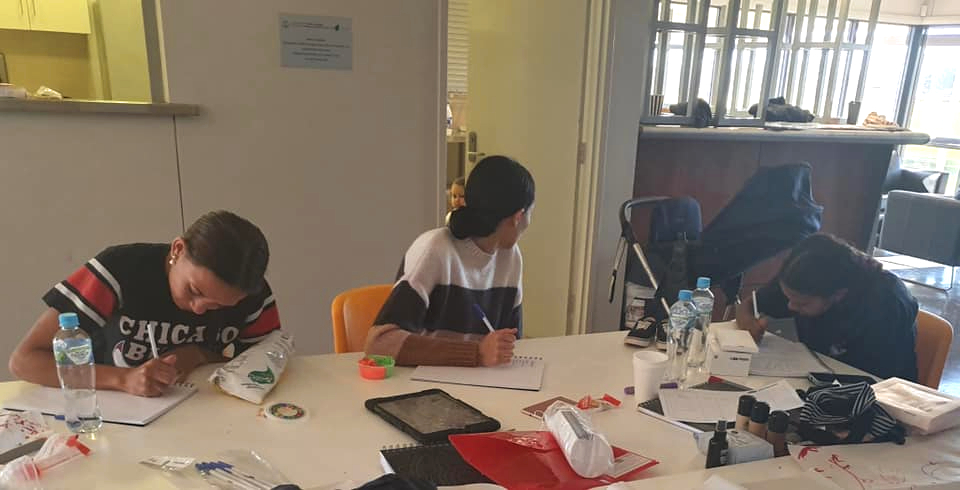
In the final report, the organisation wrote: “We did everything in our power to ensure this project went ahead, to the point where our organisation invested heavily in developing accredited training materials and training videos for the girls, so they did not think we had just walked away and left them.”
“None of it was easy but we did it for the young women.”
Past Leonora participants were trained in the delivery and support of the materials and this was a wonderful outcome that has enabled additional skill sharing for other young women in the community.
“We know from their feedback that these young women gained so much out of this and enabling them through trust in on the ground delivery gave them additional ownership for future activities such as this.”
While they didn’t achieve all the results they had hoped for with this adapted delivery model, they hope that we can make a bigger impact in future years delivering the full program in person.
“We know we touched the lives of those girls who did participate and hope to keep them engaged for future delivery.”
The town of Dirranbandi, in southwest QLD, was suffering from a lack of Christmas cheer and the general community spirit was a bit flat, following relentless drought over many years. This was also having significant impacts on mental health.
In a bid to tackle these issues, while also putting Dirranbandi on the map for both tourists and locals, the Dirranbandi Progress Association used a $60,000 Tackling Tough Times Together grant, funded by the Australian Government to spark some joy in the township with a stunning lights installation.
With the support of Balonne Shire Council, the Dirranbandi Progress Association brought local tradespeople on board, as well as their local Arts Council, the business community and a work camp, which consisted of skilled prisoners who were being reintegrated back into society. Together, this dedicated team of people designed and fabricated a beautiful display of fairy lights that were installed and displayed throughout the main streets of their town all year round.
Alongside the permanent display, the grant funded Christmas lights, which is the main feature of an annual event attended by around 300 people. Locals from the around the community gather for a BBQ and watch the Christmas lights being turned on, while school children sing carols and everyone embraces the magic of Christmas.
Since having the lights installed and hosting these events, the local community, which was crippled by drought, has been able to congregate, reconnect and have its vibrant spirit reignited. As an added benefit, the local council committed to providing extra support and resources, not only for Dirranbandi, but for surrounding towns as a result of the project.
Grant awarded to Kinglake Ranges Neighbourhood House Inc
FRRR has awarded an out-of-session grant for $30,000 to the Kinglake Ranges Neighbourhood House Inc, via the Grants for Resilience & Wellness – Kinglake Ranges program, funded by the Victorian Bushfire Appeal Fund (VBAF).
The project, titled “Co-designing our Future: Community Conversations – Kinglake Ranges Talks”, continues the ongoing support for the Kinglake Ranges communities in their long-term recovery and rebuilding following the Black Saturday bushfires that devastated the region in 2009. Specifically, the grant aims to strengthen the community’s ability to identify opportunities and priorities for the Kinglake Ranges through place based community-led consultation.
More than $770,000 in vouchers distributed
Students and families in remote, rural and regional parts of Australia will start the 2022 school year with a little extra support, thanks to the generosity of FRRR and its donors, and the Community Foundations and groups helping to distribute the more than 15,700 Back to School vouchers across the country.
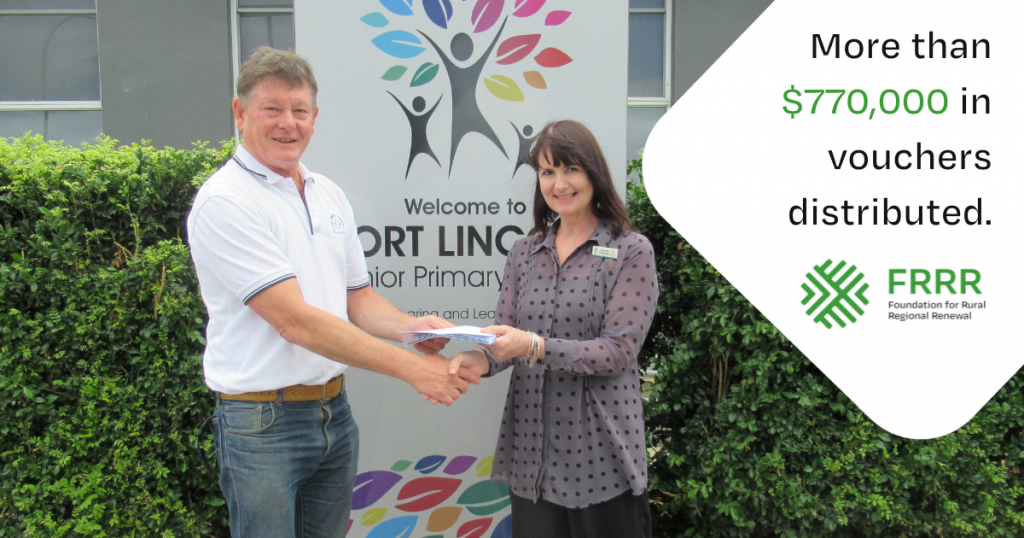
FRRR’s Back to School (BTS) program partners with community groups and Community Foundations to provide $50 gift vouchers to local families in need. The vouchers can be redeemed at select national retailers or local businesses for school essentials like uniforms, shoes, school bags or stationery.
Now in its 18th year, the BTS program has worked with community organisations in rural communities to distribute more than $10.7 million in BTS vouchers and help in excess of 216,000 students and their families get what they need to start the school year on a positive note. This includes families that have been impacted by natural disasters such as 2019-20 Black Summer Fires, flooding events, and the economic impact of the COVID pandemic.
Sarah Matthee, FRRR’s General Manager Partnerships & Services, said that the Back to School program continues to give a helping hand to rural families doing it tough.
“The unique aspect of the BTS program is that it taps into the deep understanding and the trusted relationships that local organisations have within their communities to ensure that these vouchers go to families most in need of the support.
“For many rural families, schooling and finances continue to be impacted by the pandemic. Although fifty dollars may not seem much, that little bit of extra help can go towards easing their worries in some small way,” Ms Matthee said.
In some communities, local Community Foundations also got behind the BTS program, with FRRR and its donors offering to match local donations, dollar for dollar. This year communities raised almost $63,000 in local fundraising across the country. Thanks to this community support, together with funds from the Origin Energy Foundation, FRRR was able to provide an extra 2,514 vouchers. One hundred percent of all donations to the program go directly into purchasing a $50 voucher to support a primary or secondary school student in need.
Eyre Peninsula Community Foundation, in South Australia, has worked with FRRR since 2009 to distribute BTS vouchers to local students and their families.
Garry Downey, Chair of Eyre Peninsula Community Foundation, said that the organisation sees huge need to continue to help families start their children off well-prepared for their learning years.
“The support of the FRRR program is truly valued, and their willingness to match locally donated funds creates an outstanding opportunity for Eyre Peninsula residents and businesses to boost the impact for local kids.”
You can see the full list of recipient organisations and the more than 100 remote, rural and regional communities that will benefit from these vouchers below.
BTS vouchers are funded through the support of FRRR donor partners, which include Portland House Foundation, Perpetual Foundation – Julian Flett Endowment, News Corp Australia, Fire Fight Australia Fund, Counter Point Community Services (Cycle Recycle), Bertalli Family Foundation, UNICEF Australia and Origin Energy Foundation, as well as private and individual donors.
For more information about the program, visit https://frrr.org.au/back-to-school/.
To support grant programs like this through FRRR, you can make a tax-deductible donation at frrr.org.au/giving/.
The full list of recipient organisations are below.
| Organisation | Location | |
|---|---|---|
| NORTHERN TERRITORY | ||
| Isolated Childrens Parents Association Northern Territory State Council | Mataranka, Daly River, New Castle Waters, Ti Tree | |
| NEW SOUTH WALES | ||
| Community Foundation for Albury Wodonga Region Ltd | Albury, Wodonga, Corowa, Howlong | |
| Edward Public School Parents & Citizens Association | Deniliquin | |
| First Steps Count Incorporated | Taree, Wingham, Old Bar , Nabiac | |
| Foundation Broken Hill Limited | Broken Hill, Wilcannia, Menindee | |
| Mumbulla Foundation | Bega Valley Shire | |
| The Southern Highlands Foundation | Bowral, Berrima, Mittagong, Moss Vale | |
| The Trustee for Northern Rivers Community Foundation | Alstonville, Ballina, Banora Point, Baryulgil | |
| Volunteering Coffs Harbour Incorporated | Coffs Harbour | |
| Walhallow Parents & Citizens Association | Walhallow | |
| QUEENSLAND | ||
| Biggenden Primary P&C Association | Biggenden | |
| Buderim Foundation Limited | Buderim, Mountain Creek, Sippy Downs, Kuluin | |
| Cowboys Charity Limited | Badu Island, Bamaga, Boigu Island, Chinchilla | |
| Peachester State School P&C Association | Peachester | |
| Tara & District Family Support Committee Incorporated | Tara, Chinchilla, Miles, Wandoan | |
| SOUTH AUSTRALIA | ||
| Eyre Peninsula Community Foundation Inc | Port Lincoln, Whyalla, Ceduna, Streaky Bay | |
| Foundation Barossa | Nuriootpa, Angaston, Tanunda, Kapunda | |
| Fleurieu Community Foundation Ltd | Strathalbyn, Goolwa, Middleton, Port Elliot | |
| Stand Like Stone Foundation Ltd | Allendale East, Beachport, Bordertown, Frances | |
| TASMANIA | ||
| George Town Neighbourhood House Inc | George Town | |
| Swansea Primary School Parents and Friends Association | Swansea | |
| VICTORIA | ||
| Ballarat Foundation United Way Inc | Blowhard, Ballan, Bungaree, Cape Clear | |
| Bass Coast Community Foundation Open Fund | Wonthaggi, Waterline Area, San Remo Area, Cowes Ventnor | |
| Donald Learning Group Inc | Donald, Marnoo | |
| Into Our Hands Community Foundation Limited | Wangaratta, Milawa, Oxley, Glenrowan, Moyhu, Whitfield | |
| South West Community Foundation | Warrnambool | |
| St Arnaud Neighbourhood House Inc | St Arnaud | |
| Kaniva College | Kaniva | |
| Mirboo North and District Community Foundation Inc | Mirboo North, Thorpdale, Yinnar, Boolarra | |
| The Trustee for Geelong Community Foundation | Greater Geelong, Winchelsea, Torquay, Meredith | |
| Tomorrow Today Education Foundation Ltd | Baddaginnie, Benalla, Broken Creek, Devenish | |
| Uniting (Victoria and Tasmania) Limited | Maffra, Wurruk, Longford, Seaspray | |
| Victorian Aboriginal Child Care Agency Co op Ltd | Morwell, Moe, Wangarratta, Wodonga | |
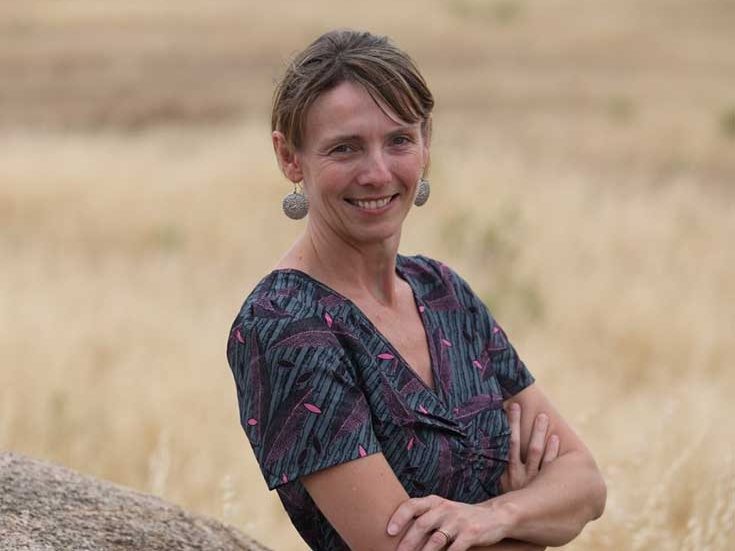
The Australian Philanthropic Services and Fiona Higgins spoke with FRRR’s CEO Natalie Egleton and Chairman Tim Fairfax AC about the crucial role of flexible funding and the impact that private philanthropy can make to regional and remote communities across the country.
“We now strive to mirror the kinds of healthy community systems we are trying to foster and support in the regions,” explains Natalie.
Local groups and not-for-profit organisations that delivered food and care hampers to community members across regional NSW during the 2021 COVID lockdowns can now apply to recoup up to $30,000 of their distribution costs. Reimbursed funds will be available in late April 2022.
The Resilience NSW COVID Regional Community Support (CRCS) program will be funded by the NSW Government and administered by the Foundation for Rural & Regional Renewal (FRRR).

Eligible hampers for the program are those delivered to people who were directed by Health orders to stay in isolation, and had no other means to access food or personal care items themselves.
Minister for Emergency Services and Resilience Steph Cooke said the NSW Government was committed to supporting community groups and not-for-profits in their important work.
“We know that many community groups had to dip into their own funds to distribute hampers and relief packs to people who needed extra support during the lockdowns,” said Ms Cooke.
“This funding opportunity will cover expenses like fuel, couriers, and logistics costs, helping them to continue their wonderful work into the future.”
Resilience NSW Commissioner Shane Fitzsimmons recognized the contributions that had been made to support communities impacted by COVID-19.
“These groups deserve our gratitude for all they have done to support their fellow community members in regional parts of the state,” said Mr Fitzsimmons.
“This program, which is being run by FRRR on behalf of Resilience NSW, will allow eligible organisations to be reimbursed up to $30,000.”
Natalie Egleton, CEO of FRRR, said that regional community groups across NSW have worked hard to support their communities through COVID, despite themselves facing funding and operational challenges.
“Rural not-for-profits’ resources are stretched incredibly thin, and for many groups, the costs of distributing these hampers came out of their own pockets, so getting money back into their kitty is vital,” said Ms Egleton.
“We have worked closely with Resilience NSW to ensure that the reimbursement application process is straight-forward but if you have any questions just give us a call on 1800 170 020 and our team will be happy to talk you through it.”
A second stream of this program will open in March. The Capacity Building Stream is designed to help strengthen local community groups and not-for-profits in regional areas, so that they are better able to continue supporting their communities through COVID and future crises.
To find out what can be funded through the Reimbursement Stream, and to apply, visit https://frrr.org.au/ResNSW-Covid-Support.
Applications close 5pm AEDT on Tuesday 8 March 2022.
Mental Health training helps community get in a good place
With the effects of plunging milk prices and bushfires in South West Victoria, the community was feeling strained. Front line workers were regularly being confronted with people breaking down because they couldn’t pay their bills, afford feed for their stock or feeling financial pressure.
The Simpson & District Community Centre (SDCC) knew it was important to keep the conversation about mental health in the community open, to continue to break down the stigma associated with asking for help. So, they wanted to equip local community members with the skills to recognise mental health issues and provide resources for referrals to support services, as well as give them skills in self-care, given they were dealing with more and more people in crisis.
SDCC was established almost four decades ago to support Western Victorian dairying communities. Around 50 people a week use its facilities for meetings and activities – from craft, scrabble days, children’s activities, adult education, digital literacy, a Men’s Shed programme and more. The centre puts considerable effort into reducing social isolation and increasing health and wellbeing in the area.
The Simpson area has been supported by a Dairy Community Support Officer who works with farming community families in crisis. In three years, the social worker’s client numbers went from 9 to 98. She identified a number of mental health issues facing the community including anxiety, depression, drug and alcohol abuse and self-imposed isolation. The community has had one suicide since the beginning of the dairy crisis and wanted to do whatever was needed to prevent more.
Through the In a Good Place Program, funded by CCI Giving, FRRR was able to help fund the delivery the training. In March 2019, nine community members participated in a two-day Mental Health First Aid course. Another session ran in March 2020, with a half day refresher for the previous years’ participants.
In total, 16 members of the community were provided with the training and skills to identify and start a conversation regarding mental health. Those trained included workers from the local supermarket and Post Office, stockfeed supplier and vet group, as well as dairy farmers and volunteers from the Football Netball Club, Men’s Shed, Community Centre, Cricket Club, CFA and Landcare network. The array of participants meant that there was great community coverage, with everyone attending wearing “more than one hat” – so those new skills are going into nearly every organisation and workplace in Simpson.
Furthermore, the instructor for the First Aid program and the Dairy Community Support Officer were able to identify an opportunity to secure funding for additional training that will reach the community, regarding Mental Health in the elderly population. Transitioning off farms for older people is an area of mental health difficulty that the Support Officer sees first hand in her work in the community.
The SDCC maintains that if just one person can be supported through a crisis without a tragedy, then the program will be a success.
“Training more people in the community to recognise the signs and direct them to help or help to them can only improve the long term outcomes for our community and increase the resilience and sense of connection.
“By providing the training we are giving people the skills to take back into the community at their workplaces, homes and recreation activities. The more people who are able to recognise and respond to the signs of deteriorating mental health the stronger our community will be. These skills will be maintained for life and can be shared.”
SDCC Final Report
Congratulations to the SDCC for the great strength and support they provide and their ability to adapt to the community’s changing needs.
